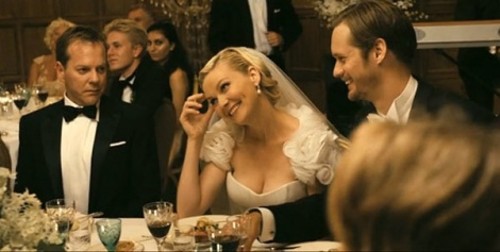Whatever else you might want to say about Lars von Trier—and it’s hard to imagine that it hasn’t been said before, in tones ranging from befuddlement to outrage—give the guy this: Rarely has there been an auteur who has turned lack of subtlety into such an artistic virtue.
This quality clearly bit von Trier in the ass during his now-notorious Cannes Film Festival press conference for his latest film, Melancholia, where his sardonic comment “I understand Hitler … I sympathize with him a little bit” turned him into a pariah. But you only needed to look at his 25-year filmmaking career to see that grand, risky provocations virtually define his work: the voice-of-God finale of Breaking the Waves; the “death to all artifice” proclamation of the Dogme ’95 manifesto; the refutation of that whole idea in the Brechtian, brilliantly staged allegory Dogville; the “Did I really just see that?” moments in 2010’s Antichrist. For all the grainy, hand-held minimalism that he has employed over the years, von Trier is really about throwing emotional haymakers. When they land, it’s a knockout. When they miss, he’s likely to end up flat on his face.
Melancholia opens with an eight-minute prologue that suggests he’s going for that first-round KO—and he almost achieves it. In gloriously lush slow motion, scored to Wagner’s Tristan und Isolde, von Trier introduces scenes that portend what is to come: the bleak face of a young woman named Justine (Kirsten Dunst); another woman and her son trudging across a golf course; the apocalyptic collision between the Earth and another celestial body. The mesmerizing series of tableaux and the operatic crescendos combine to build a unique combination of beauty and despair. This is von Trier distilled to his essence: Even if the imagery is surreal, or unsettling, there’s no question about the mood he’s trying to set.
The mood continues into the first part of the main narrative, in a way that’s almost equally remarkable.
It’s the wedding day of Justine and Michael (Alexander Skarsgard), a lavish affair put on by Justine’s sister, Claire (Charlotte Gainsbourg), and wealthy brother-in-law, John (Kiefer Sutherland). But it’s far from a blissfully happy day for Justine, whose emotional unsteadiness begins to emerge throughout the evening. Dunst turns in a devastatingly spot-on performance, capturing moments of paralyzing depression and self-destructive actions even as she reaches out for help to family members who seem to have no idea what to do for her. The familial drama occasionally reaches almost absurdist levels, like the venomous antagonism between Justine and Claire’s divorced parents (Charlotte Rampling and John Hurt), but von Trier uses the stop-start rhythms of a celebration turned toxic to convey a mental illness that doesn’t decide to take a holiday.
There is, unfortunately, another half to Melancholia: the massive metaphor that gives the film its name. A planet called Melancholia has drifted into the Earth’s orbit, and while amateur astronomer John tries to assure everyone that the scientific data argues against any threat to life on Earth, Claire becomes consumed with worry. It’s here that von Trier loses focus on the most compelling aspect of his story, as Justine’s stay with Claire’s family after the disastrous wedding day begins to be more and more about Claire (the title card for Part 2 promises as much). There’s potential for an intriguing juxtaposition of genuine clinical depression and the simple mounting anxieties of modern life, but von Trier doesn’t seem to know what to do with that idea, other than have a resigned Justine comment that “life on Earth is evil.”
Perhaps that’s just the tradeoff you have to accept when you’re dealing with a Lars von Trier film. When he’s at his best, he’s transcendent, a filmmaker whose refusal to consider half-measures offers the potential for truly gut-rattling genius; when he’s at his most frustrating, he’s a guy who doesn’t know when he’s already landed his most devastating punches, continuing to pound away at his subject matter until it’s an unrecognizable pulp. For more than an hour, Melancholia burrows into the pain of depression with agonizing clarity and artistic precision. Then Lars von Trier spends nearly another hour throwing an entire celestial body at the problem, as well.
MELANCHOLIA
Kirsten Dunst, Charlotte Gainsbourg, Kiefer Sutherland
Rated R
More by Scott Renshaw
-
Feature film review: THE BEAST
A filmmaker's compelling ideas get a bit tangled in references to his creative influences.
- Apr 17, 2024
-
Faces of Salt Lake County book and portrait reception
Images and personal stories in a new book reveal local demographic diversity
- Apr 17, 2024
-
Film Reviews: New Releases for April 12
Civil War, Escape from Germany, Coup de Chance, Hundreds of Beavers, La Chimera, Sting
- Apr 11, 2024
- More »
Latest in Film Reviews
Readers also liked…
-
Power Plays
Two satirical comedies explore manipulations and self-delusions by those with power.
- Aug 31, 2022





